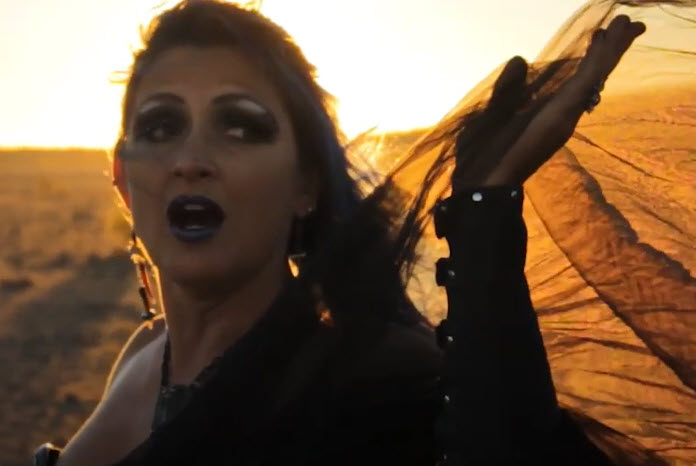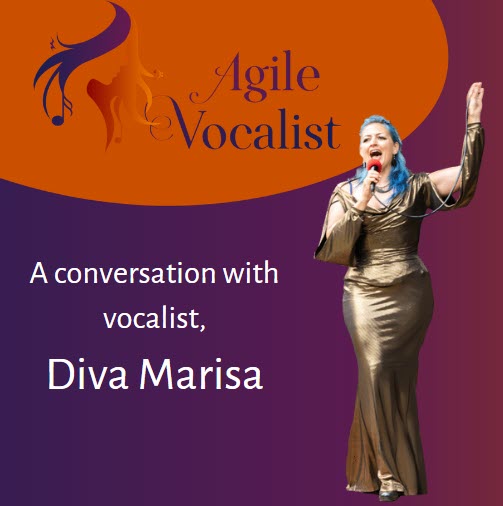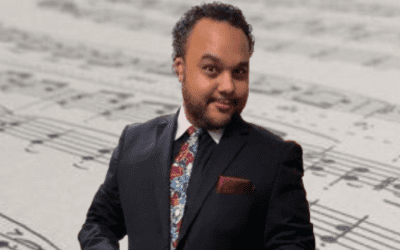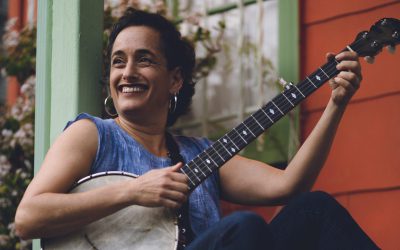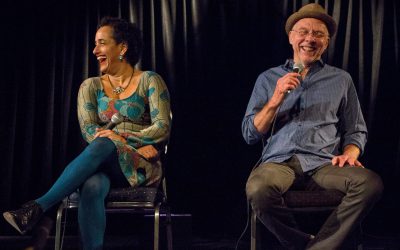Diva Marisa is in search of opportunities to offer audiences music in context. As a conservatory-trained opera singer and community member of Death Guild Thunderdome (performances happen at Burning Man), she talks about Burning Man’s impact on experiential art everywhere. Bringing opera to Burning Man has helped Marisa reimagine and expand the audiences that appreciate opera. Marisa’s early vocal experiences at first caused her to reject opera, but then she fell back in love with the intensity and dedication required to be a performer.
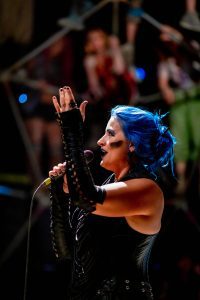
Image: Luc Asbury
With her San Francisco Bay Area roots, Marisa was first cast by Gregangelo Museum and Velocity Circus founder, Gregangelo Herrera to sing her signature piece, Diva Dance–from the movie The Fifth Element. That partnership grew to new heights (ahem) as she began to perform in unique contexts, including singing while on the trapeze for Gregangelo Museum events and beyond.
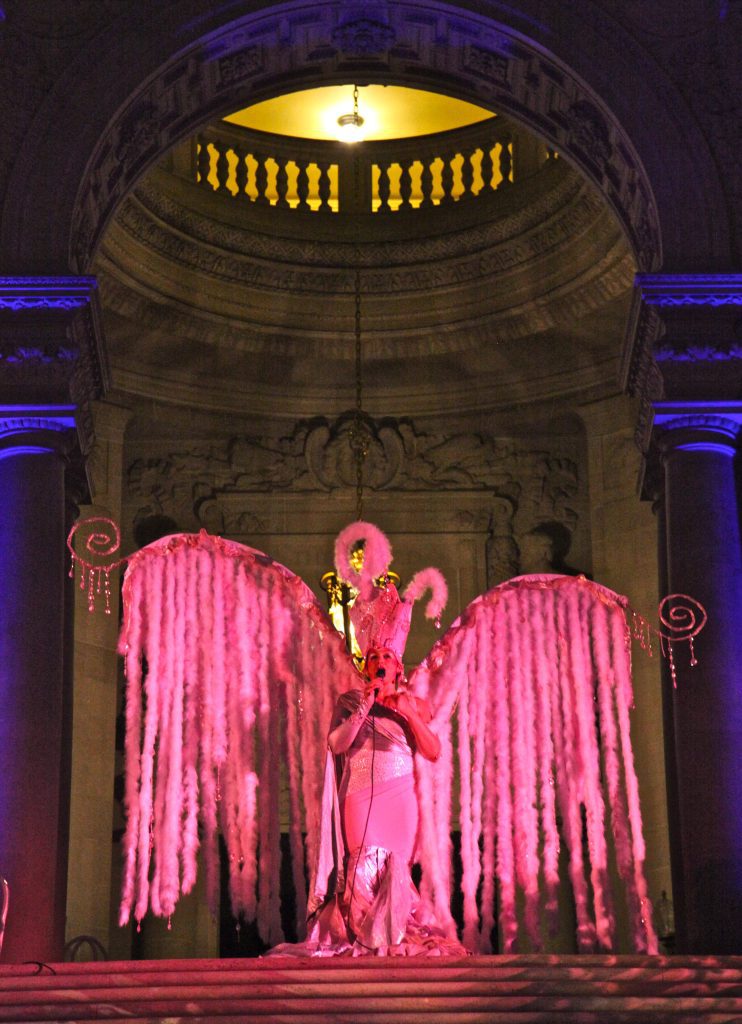 Image courtesy of Velocity Circus.
Image courtesy of Velocity Circus.
This episode is being released on the 20th anniversary of when Marisa’s first performance of opera at Burning Man.
To listen to this episode as a podcast, search for Agile Vocalist anywhere you get your podcasts.
Marisa’s Bio:
Diva Marisa is a maverick singer and performer based in the San Francisco Bay Area. As a conservatory-trained opera singer, Marisa has sung with the San Francisco Opera, the Oakland East Bay Symphony, Chris Brubeck, and multiple times in recital with Frederica von Stade. Marisa also sings opera on the trapeze in various settings, including the Thunderdome at Burning Man. Her signature aria is Diva Dance from the movie The Fifth Element.
She has sung for celebrities from Rwanda’s President Paul Kagame to Jean-Paul Gaultier. When he heard her sing, Francis Ford Coppola added a singing scene for her in his indie vampire movie, Twixt.
In 2017, Marisa conceived and created Third Wall Music, a salon-style performance concept that brings music, and the stories behind them, into people’s homes. Marisa is always looking for unique places to perform, particularly for audiences who are not familiar with opera. Through Third Wall as well as other productions, Marisa seeks to educate, to perform music in context, and to elevate other performers and provide new performance experiences.
In this episode, Marisa talks about:
- San Francisco Girls Chorus
- Singing on trapeze/with the circus: Velocity Circus & the Gregangelo Museum
- The Fifth Element aria
- What’s coloratura
- Mad Max Beyond Thunderdome (a model for what happens at Burning Man in the Thunderdome)
- Death Guild Thunderdome
- Sonic Runway in San Jose, California
- Kurt Larson of Information Society
- Third Wall Music
- Hildegard von Bingen
In this episode, you’ll hear Marisa sing:
- Hildegard von Bingen in Le Mont Saint Michel
- “Freebird” by Lynyrd Skynyrd
- “Diva Dance” from the movie, The Fifth Element
- The types of soprano voices there are and what coloratura is, an excerpt from one of her porch concerts
- “Queen of the Night” from Mozart’s Magic Flute
- “Musetta’s Waltz” from Puccini’s La Bohème
- “Juliet’s Waltz” from Romeo and Juliet by Charles Gounod
- “O mio babbino caro” from Giacomo Puccini’s Gianni Schicchi
Did you enjoy this? Please share it with your arts and sound-loving friends. Don’t forget to subscribe for more from Agile Vocalist.
Transcript
[Diva Marisa singing in Mont St. Michel]
Podcast intro: Welcome. Listen to this next Agile Vocalist podcast.
[Music ]
Marisa: And in 2017, I created something called Third Wall Music, which is a salon. And I’m obsessed with music in context. And this is what’s been driving me for the last few years. So currently, it was like, how can I push myself physically? How can I bring opera to Burning Man in a way that will be well received? How can I — all of these questions. And the current question is, how can I make people understand — in the United States, that in 1776, we had the end of a revolution, but Mozart was 20. And that was happening at the same time
And when we think about these things, and we think about what inspired the music that we hear, Dido and Aeneas, you know, it was at a time — Cromwell basically eliminated political plays. And so, all of these people who’d never written an opera before start turning to opera because you could still write political operas, and you could still put a ton of subtext in opera, as long as it was musical.
Rachel guest intro: Diva Marisa is a maverick singer and performer based in the San Francisco Bay Area. As a conservatory-trained opera singer, Marisa has sung with the San Francisco Opera, the Oakland East Bay Symphony, Chris Brubeck, and multiple times in recital with Frederica von Stade. Marisa also sings opera on the trapeze in various settings, including the Thunderdome at Burning Man. Her signature aria is “Diva Dance” from the movie “The Fifth Element.” She has sung for celebrities from Rwanda’s President Paul Kagame to Jean-Paul Gaultier. When he heard her sing, Francis Ford Coppola added a singing scene for her in his indie vampire movie “Twixt.”
In 2017, Marisa conceived and created Third Wall Music, a salon-style performance concept that brings music and the stories behind them into people’s homes. Marisa is always looking for unique places to perform, particularly for audiences who are not familiar with opera. Through Third Wall, as well as other productions, Marisa seeks to educate, to perform music in context, and to elevate other performers to provide new performance experiences.
Marisa: I was a loud kid, and my mom convinced me to audition for the San Francisco Girls Chorus when I was seven, which I did, and she made sure that I had very low expectations, because that’s how Gen X rolls. And she wanted to make sure I didn’t get my hopes up, and I got into what’s now level two at the time, which was called the training group, so it wasn’t even the bottom level. And I sang with them, and I progressed up, and I made it into their professional level group when I was 12.
And at that point I started getting private voice lessons. At that point you can start learning some very basic techniques that will carry you into opera. I’m allergic to the idea of child opera singers, because, well, children can technically sing opera, but children are not singing big Verdi arias successfully, right? They’re not opera singers. They’re parodying, so that’s a whole other rant.
But I started with these very, very simple arias vocalizes when I was 12 to get me to, as my voice matured, women’s voices also do change and crack. Of course they do. Just more subtle than when a boy’s voice does it. And so at the end of it, my first… I started getting good. My first solo was at Davies Symphony Hall for the San Francisco Girls Chorus Christmas Carol Sing Along. I sang a verse of “Go Tell It on the Mountain,” and I had never sung a solo before. And the rest of that year, that was my sophomore year of high school, and the rest of that year I was in their top-level performing group and had a couple of other showcasey bits. And when it was done, and I was like, “I never want to sing opera again.” Forget it. I am not interested. This is a lot of work.
And I was like, “I’m going to be a psychiatrist or a psychologist,” because I want a PhD.
[Marisa singing Free Byrd, by Lynrd Skynrd] If I leave here tomorrow Things just wouldn’t be the same. ‘Cause I’m as free as a bird now. And this bird you cannot change God help me, I can’t change. So much did you get.
Marisa: So I go down, and my dad’s very smart. And my dad had given up a career in writing to go into banking and raise three kids and support a family, right? So, he’s very passionate about it. Meanwhile, my mom was a German immigrant who was like, “Absolutely not. You’re not going into the arts, and I’m not paying for it, because you need to have money. And I want you to be a surgeon. You’re smart. I want you to go be a doctor.” She never suggested — she’s one of the few people in my life who never suggested I marry rich. Most women her age were suggesting that I find a man with money. My mom never suggested that. She was like, “Get your own money.” And my dad was like, “I’ll pay for it.” So much to her chagrin.
So, I went down. I did six weeks. And this was like, you’d wake up at six. At seven, you had a movement class. At eight, you’d have breakfast. Nine to noon, you were in — I mean, we did vocal coaching, which is, as you know, different from voice lessons. But for any of your listeners, coachings are when you work with a coach on diction, timing, musicality, all that stuff, and then voice lessons, where you work on just your technique, and then language lessons, opera lessons, movement lessons, tai chi. And we were in class from 9 a.m. to 9 p.m., and then the seven to eight was like a, “You should probably do this thing, too.” And we did three recitals. At the end of six weeks, I was like, “This is all I want to do with my entire life.” My dad’s very smart. And that was sort of the beginning of my offbeat music career.
Rachel: Yeah, let’s talk about that.
Marisa: Yeah, and I hit it. I hit it from every — because at the time, everybody who was involved with classical arts was like, “Burning Man, pulling your drugged-up hippies.” And I’m like, “Well, it’s not like that, but I’m not prepared to have this argument, so I’m going to keep going into your auditions with my pearl earrings and my perfectly pulled-back hair wearing a suit.” Which, of course, didn’t work. It’s not authentic for me. It’s not who I am. But I kept those two worlds really separate.
Rachel: For how long?
Marisa: Well, in 2003 — so 2001 — no, that’s a lie. 2002, I got asked to perform at Burning Man Decompression, which is an event that they do in San Francisco after cleanup of the Desert has been completed. So, it’s end of September, early October. And a gentleman named Steven Raspa, who was an arts curator for Burning Man, still worked for them. He does the regional stuff. Had brought two co-owners, a circus troupe owner and his partner, to hear me sing at Decompression. And that was how I met Gregangelo. That was in 2002. And in 2003, Greg got a call for somebody who could sing the piece from The Fifth Element, which is my signature piece. And I joined the circus in 2003. And that’s kind of the rest-is-history story.
[Music
Marisa: “Oh, Burning Man changed my life!” Like, okay. You were open to your life being changed. And then you could have gone on, you know, you could have joined the Peace Corps, you could have done any number of things and would have had a similar… You were ready for a catalyst or you wouldn’t have set foot.
Rachel: Uh-huh. I gotcha, gotcha.
Marisa: And so, I think, like I said, I think most evangelists are pretty annoying. But that doesn’t take away from the fact that Burning Man is significant.
Rachel: So talk to me then about Death Guild Thunderdome specifically. Yeah. Is it a… How to think of it? Is it a tribe or a subset of the Burning Man community? Is it an event? Is it a place? Is it… How would you describe it? What does it mean to you?
Marisa: Community of misfits.
Rachel: Okay.
Marisa: Death Guild is a nightclub that was started in 1993. And Death Guild Thunderdome was a group of people who in ’97 went out to Burning Man for the first time. ’98 came out and were like, “We’re going to bring something that’s not techno.” And then ’99, it was the year I joined, brought the Thunderdome. Got it. Because they wanted to provide something interactive. We wanted to provide something interactive. I was camping there the first year, but I was not involved in the planning because that’s the summer I moved back from New York. New York, better.
So, I joined, but I don’t ever… I was there the first year of the Dome, but I don’t refer to myself as a founding member because I wasn’t involved in the planning. Okay. I am definitely pretty spectrumy and I’ve got very specific. I’m like, “Nope, I was not there for the planning, so don’t say that I was there for the planning.” Because it feels disingenuous.
Rachel: Right, right.
Marisa: So, yeah. So I’ll say I was there the first year and we were all people who worked security in nightclubs. We were employed by nightclubs. We were goths. We’d listen to industrial music, rode motorcycles. And so, it felt like a natural evolution. And now there’s the person who founded Deathguild, the nightclub doesn’t attend anymore. Oh. And so it’s kind of an odd split because we have minimal nightclub security still coming out. And then it’s multinational. We have people in England, France, Canada, all over the United States who are part of Thunderdome.
And as we have come out to Burning Man, more people have been wanting to be involved. We’re a community first and foremost outside of and separate from Burning Man. Burning Man does not make us a community. We were a community before we went to Burning Man. And so I think one of the reasons we have such cohesion is because our connection is not through Burning Man. We’re beyond that. We go camping together because we figured we could camp safely. We can’t run the Dome safely until there’s herd immunity. But we’ve been camping fully back, like a very science-based group of people. And we’re like, “We love each other. We hang out.”
Marisa: Coloratura Coloratura, there’s a bunch of different types of soprano. Lyrics, binto, are different styles of soprano, not ranges, right? So you have… and coloratura. It’s all about where your voice is strongest. And my voice is strongest in the really high, fast stuff. That’s called coloratura. There’s also soprano, mezzo-soprano, contralto. Those are your ranges of soprano. But coloratura is like all that crazy, high, fast stuff. You’ll get baritones who do some of it. All voice types eventually do it. But coloratura is my voice type. Dramatic coloratura is my voice type. So that leads me to the next logical song.
[singing]
Marisa: And so Burning Man is an event that we do as a community. But Deathguild Thunderdome is its own community for sure. We throw the dome for other events. We have some paid events and some other fun events that we do. Wasteland Weekend is one of the ones. Our net cost for them is neutral, which is fantastic. We pay to go to Burning Man and we have a couple of paid events that we get paid to do.
Rachel: And so when Deathguild Thunderdome is present at Burning Man, what is… I mean I’ve done a little bit of research on this, but what is it that actually happens?
Marisa: Tea party. Tea party with opera, yes. Crocheting. I mean what the Thunderdome does is we recreate a terrible movie from the 80s. Mad Max Beyond Thunderdome, which is a really mediocre 80s film that had Tina Turner, who is a goddess. The upshot is we build a geodesic dome, a 44 foot wide, 22 foot high geodesic dome. And we have a DJ booth and we play industrial and other music while we harness people up, give them padded weapons and let them battle each other. That is the shortest version.
The whole rigamarole is like rent a truck, bring up $20,000 of sound equipment, set up a Dome, set up scaffolding to create the frontage of camp so that you can camp behind it, set up a main tent for shade structure, get the sound set up, get everything rigged
Rachel: So sound, it’s really about sound or is it about… it’s about experience, right?
Marisa: It’s about the experience. And given that Deathguild was our roots, the music is super important because there’s still very little opportunity to hear the kind of music that people who wear a lot of black want to hear.
There’s a lot of stuff out there and there’s a lot of great music out there, but there’s other really cool stuff that’s happening out there for big audio now that’s like there’s the Sonic Runway that I’m involved with and that’s like, that’s a runway that’s a kilometer long that has these tubes that are sound reactive and I’ve gotten to sing into it. I collaborate with them. And we camp and we sit and we talk during the day and like we don’t… we love each other so much.
We just love to sit during the day once everything’s set up so we have a show every night. So you can’t get drunk, you can’t go do drugs during the day, you can’t… any of that stuff. It’s like you get to get drunk after, go do your stuff after if that’s what you’re into. Like six people, five people in camp who are sober. So that’s not our purpose. The purpose is to produce a show. We produce a show for three hours active every night, which as you know… That’s a long time. …is not just a long time, but that’s not… you don’t just start the show. That’s an hour set up. That’s call time. Your call time is, you know, we do the whole thing every night, Monday through Friday. That’s what we do.
Rachel: And are you the only singer or are there other performers? There are other performers in Thunderdome. Yes, in Thunderdome. There have been other vocalists, haven’t been out in a while. Kurt Larson, who’s one of our founding members, was the lead singer for Information Society. He is the lead singer for Information Society, which is a band and his wife is also a singer. And so he and I have sung some stuff together. The three of us have sung some stuff together. They’ve done stuff together in the Dome. I’m the only opera singer. We have belly dancers, we have four performers, we have circus artists, so you get a lot of cool shit that way. We have a badass woman who cooks a creme brulee with a flamethrower. You know, there’s cool shit.
Rachel: Given the background that you shared about your vocal training and how performance and theater and movement were such a part of those years where you were first turned off and then turned on, how did you end up at Aerial Arts and when did that artistic path start accompanying you and holding your hand and saying, “You want to do this and sing!” upside down?
Marisa: So like, there’s the “I’m going to be an opera singer.” Then there’s “I’m going to sing opera over techno.” And it started with the Fifth Element piece. That’s the first thing I sang in the Thunderdome was the piece from the Fifth Element. And then I started working with different composers, singing opera over techno, kind of doing some operatic modern stuff, right? And as I’m doing this, so 2003, I still only had one or two techno songs, like the Fifth Element and one other one, because I don’t compose myself. I was just not… it might be a thing. That’s about when I met Gregangelo. And you know Gregangelo, Velocity Circus, right? There is nothing outside the realm of possibility. Greg puts me in this 12-foot-wide pink concoction where I can barely move because he’s like, “Well, you’re not an aerialist. I normally costume for aerialists. You don’t have to move. So, I’m going to make this as hellish for you as possible.”
These massive wings, fitted skirt. I was Venus. My skirt was supposed to be toxic, toxic gas clouds of Venus, big hat. I’m like nine feet tall. These are not exaggerations.
Rachel: Yeah, no.
Marisa: These are not exaggerations. These are performer reality. I am strapped into these wings and that’s it and I can’t move. And so we’re touring with the circus and we’re doing all these things and we’re doing a lot of gigs and we’re doing a lot of corporate. We’re doing a lot of corporate stuff. And we’re in Ohio and I’ve toured with the circus to Ohio twice. Twice?
Rachel: What year are we talking?
Marisa: 2003 and then again in 2006. Been to Ohio twice with the circus. Okay. Yeah. Cincinnati or somewhere or… Cleveland. And Dayton. Nice. And Bend, Oregon. And we did a show on the Warner Brothers lot and all of this is usually the Fifth Element piece with the pink wings and pink wings. And then like… And we are crammed like minimum of two people to a room with adjoining rooms in like the cheapest possible motel, wherever it is. Yeah. Because it’s the circus. You’re not making money. You’re cost saving.
Rachel: Right.
Marisa: Greg’s in the adjoining room and he bursts in and he’s like, “I need you to do operatic Tarot readings.” And I’m like, “You need me to what?” He’s like, “I just had a fortune teller back out.” I’m like, “Let’s have a gig next week.” I’m like, “All right.” I don’t know about Tarot but like, “Let’s figure out what we can do.” So we came up with this act. Like in 20 minutes, half an hour, we came up with this act and we’re like, “I will sit with you and you will pick a color and the color will relate to an opera.” “And I have my opera book.” So like Verdi obviously is green. Yes, because they’re right. It does get more interesting than that. Like Red is Carmen. Right. There’s different relatable things. And then I asked them to focus on a question. And then I tell them some absolutely asinine bullshit about what’s going to happen in their life and that life is going to be exactly like this opera. And then I sing to them. The schtick is… Because I’ve had people be like, “What’s my future? That’s not right. I don’t even have a husband.” And I’ll just lean in and I’m like, “You’re at a corporate party talking to an entertainer.” “Be entertained.” And they’re like, “Come on, come on.” And all the respect to the people who do this for reals.
But like, I think it’s pretty clear that I’m not that operatic fortune telling. So I sing them a thing and so since then, it’s been more creative, more creative. And then, you know, I’m in my thirties at that time. And I’m like, “Well, shit. I can’t just eat whatever I want anymore.” And I’ve always been super strong. Oh. So I was like, “Let’s start trapeze.” Greg’s like, “Absolutely.” So Greg immediately, of course, jumps on it and is like, “Let’s get you on the trapeze. Let’s get you singing on the trapeze.” I’m like, “This is the dream.” So by… I can’t remember. Maybe it was 2008 was my first performance of Opera on the Trapeze because I was like… Because you could. Because I could. Because I was, you know… Anyway, that was the evolution of that. And so now it’s like… It’s kept me alive during the pandemic, really. I take classes at the circus school, which pretty quickly shifted to being able to do stuff online. And I just bought packet after packet of class so that I could just be active every day because I have a desk job, I have a day job. And I sit. Oh, yeah. And I don’t move and I forget to move and it’s terrible. [Music]
Rachel: Where do you get your inspiration when you are working on new material or revisiting material for a next performance or show? What state of mind or what physical place do you really get that juju from?
Marisa: I feel like if you were to chunk my kind of performing into phases, it’s the choral and strong musicianship background. The interest in opera. And then it’s a graduation to opera with techno and kind of playing with these other fields. And then I got into really Renaissance music and singing for churches because they, I love Renaissance music. The quality of the performing is so incredibly high and churches pay really well.
And then the really circus element of things and working with different composers to kind of create new stuff. It’s one of my favorite things is when a composer sends me a track and I will steal lyrics from operas. I’ll steal words from someone else. And then I’ll create my own melodies and I love, I’m really good at writing melodies. So I’ll just drop those over something. And then my current phase has really inspired a lot because I’ve been so reactive my whole life in terms of music. Like what’s available? What’s interesting? What’s somebody else creating?
And in 2017 I created something called Third Wall Music, which is a salon. And I’m obsessed with music in context. And this is what’s been driving me for the last few years. So currently it was like, how can I push myself physically? How can I bring opera to Burning Man in a way that will be well received? How can like all of these questions?
And the current question is, how can I make people understand in the United States that in 1776 we had the end of a revolution, but Mozart was 20. And that was happening at the same time. And so when we think about these things and we think about what inspired the music that we hear, Cromwell basically eliminated political plays. And so, all of these people who’d never written an opera before start turning to opera because you could still write political operas and you could still put a ton of subtext in opera as long as it was musical.
So, like the reasons we hear music, you have slave songs that are just the best example of this that are like, you know, and white people have no business singing that because this is the context. Context is absolutely so important. And so I get a little ranty. So I started this salon. The first one was Nasty Women because it was… Yeah, that was the time. That was the freaking time. And I was just, it was…
Rachel: So was that 2016?
Marisa: Well, I did it on the Solstice. December 21st of 2017 was the first one. Okay. And I was in the house and I talked about Hildebrand von Bingen, who was a super rebellious, abbess, bad ass from the, you know, mostly the 12th century. She was born in the 11th century. And like all of these things that you don’t think about, that you don’t hear about, and how the music that we love and are familiar with came to be. One was all about, was called intoxicating and it was all about drugs and how drugs and alcohol influenced the performers that we know. And I did finally get to do ’76. So I did 1676. My colleague did 1776. Another friend did 1876. And finally, one friend did folk songs inspired by Vietnam for 1976.
Rachel: Oh wow.
Marisa: And so if you come to the porch concerts that I do, I talk about the context of what was happening at the time and why the music is written the way it was last night. I sang some Handel and when you talk about Handel and you talk about the music written in 1700s, it becomes very important to talk about the castrati.
Rachel: Yeah. Right. Oh gosh, yes.
Marisa: Because there are people in the audience who didn’t know that that’s a thing that used to happen to young boys. And so like that’s what’s driving me is creating these contextual experiences. And really my dream of the next level is to like come in and educate about this. Is to like do these educational bits where, you know, because the salon was deliberately done in people’s homes. It was with max audience capacities of 25 because I want to bring it back to being completely accessible. So each performer would talk for about 10 minutes and then perform for about five. Okay. And it’s my dream environment. And the best thing is people who host are opening up their homes. Yep. Everybody gets paid.
[singing]
Rachel: There’s actually a theme here that I’m digging to see if it will come up for you because it’s come up in 85% of my interviewees. Where do you get inspired? Where do you get your ideas?
Marisa: Um, I go running. There’s a beach three blocks from my house. Okay. Water is very, very stereotypical answer, but it’s stereotypical because it’s true. Water, nature are inspiring to me. Running and physical activity. If I need to reset, I will go for a run. I will go connect. The second one is my front porch. My front porch, I’m not joking, has kept me alive during the pandemic. It’s been the spot where I visit with my friends. It’s been the spot where I’ve gotten to know my neighbors better than I knew them in the 14 years we’ve lived here. Yeah. I drink my coffee. I go deep inward. I’ve kept a journal every day since I was 12. I’m on number 87. I’m just finishing up number 87 now. And so I go deep and I meditate. And my friends, my colleagues, the other people in the artistic world, I am inspired by the curiosity of others. So, when I speak with someone who is naturally inquisitive, something like this will set me on a path of innovation. Because it’s a forced reflection. And also, when I watch somebody else, I freaking, if you want to talk to me for 90 minutes, okay, maybe 20 minutes about like this insect that you’re studying and how it’s part of the evolutionary process, just be super into something, be so into something that like you can’t shut up about it. And so people like that who unapologetically dive deep are deeply inspiring to me. So people, places, and myself
Rachel: Okay, great. Beautiful. [Music]
Podcast outro: That was inspiring. Be sure to listen again soon. [Music] Agile Vocalist is created and produced by Rachel Medanic. Editing by Ben Krueger. Agile Vocalist design and branding by Sasha Brandt. [Music]

